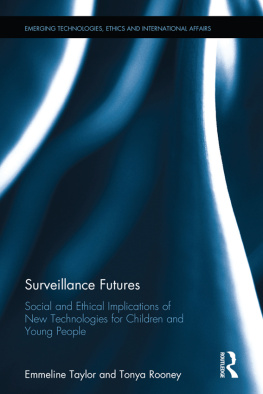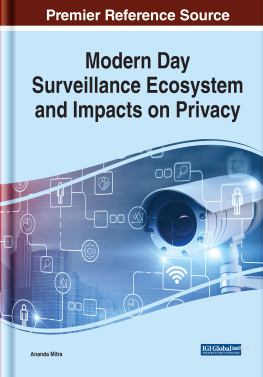Surveillance Futures
From birth to adulthood, children now find themselves navigating a network of surveillance devices that attempt to identify, quantify, sort and track their thoughts, movements and actions. This book is the first collection to focus exclusively on technological surveillance and young people. Organised around three key spheres of childrens day-to-day life: schooling, the self and social lives, this book chronicles the increasing surveillance which children, of all ages, are subject to. Numerous surveillance apparatus and tools are examined, including, but not limited to: mobile phones, surveillance cameras, online monitoring, GPS and RFID tracking and big data analytics. In addition to chronicling the steady rise of such surveillance practices, the chapters in this volume identify and problematise the consequences of technological surveillance from a range of multidisciplinary perspectives. Bringing together leading scholars working across diverse fields including sociology, education, health, criminology, anthropology, philosophy, media and information technology the collection highlights the significant socio-political and ethical implications of technological surveillance throughout childhood and youth.
Emmeline Taylor is a Senior Lecturer at the Australian National University and has been researching the exponential growth of surveillance technologies in schools and the increasing monitoring of young people for over a decade. She is the author of Surveillance Schools: Security, Discipline and Control in Contemporary Education (Palgrave Macmillan, 2013).
Tonya Rooney is a Lecturer in the Faculty of Education and Arts at the Australian Catholic University and has published widely on children and surveillance technologies.
Emerging Technologies, Ethics and International Affairs
Series Editors: Steven Barela, Jai C. Galliott, Avery Plaw and Katina Michael
This series examines the crucial ethical, legal and public policy questions arising from or exacerbated by the design, development and eventual adoption of new technologies across all related fields, from education and engineering to medicine and military affairs. The books revolve around two key themes:
- Moral issues in research, engineering and design; and
- Ethical, legal and political/policy issues in the use and regulation of technology.
This series encourages submission of cutting-edge research monographs and edited collections with a particular focus on forward-looking ideas concerning innovative or as yet undeveloped technologies. Whilst there is an expectation that authors will be well grounded in philosophy, law or political science, consideration will be given to future-orientated works that cross these disciplinary boundaries. The interdisciplinary nature of the series editorial team offers the best possible examination of works that address the ethical, legal and social implications of emerging technologies.
Most recent titles
1. Social Robots: Boundaries, Potential, Challenges
Marco Nrskov
2. Legitimacy and Drones: Investigating the Legality, Morality and Efficacy of UCAVs
Steven J. Barela
3. Super Soldiers: The Ethical, Legal and Social Implications
Jai Galliott and Mianna Lotz
4. Commercial Space Exploration: Ethics, Policy and Governance
Jai Galliott
5. Healthcare Robots: Ethics, Design and Implementation
Aimee van Wynsberghe
First published 2017
by Routledge
2 Park Square, Milton Park, Abingdon, Oxon OX14 4RN
and by Routledge
711 Third Avenue, New York, NY 10017
Routledge is an imprint of the Taylor & Francis Group, an informa business
2017 Emmeline Taylor and Tonya Rooney; selection and editorial material, individual chapters, the contributors
The right of the editors to be identified as the author of the editorial material, and of the authors for their individual chapters, has been asserted in accordance with sections 77 and 78 of the Copyright, Designs and Patents Act 1988.
All rights reserved. No part of this book may be reprinted or reproduced or utilised in any form or by any electronic, mechanical, or other means, now known or hereafter invented, including photocopying and recording, or in any information storage or retrieval system, without permission in writing from the publishers.
Trademark notice: Product or corporate names may be trademarks or registered trademarks, and are used only for identification and explanation without intent to infringe.
British Library Cataloguing-in-Publication Data
A catalogue record for this book is available from the British Library
Library of Congress Cataloging-in-Publication Data
Names: Taylor, Emmeline (Convenor of criminology), editor. | Rooney, Tonya.
Title: Surveillance Futures/ edited by Emmeline Taylor and Tonya Rooney.
Description: Abingdon, Oxon ; New York, NY : Routledge, 2016. | Includes bibliographical references.
Identifiers: LCCN 2016008652| ISBN 9781472455635 (hardback) | ISBN 9781317048121 (ebook)
Subjects: LCSH: Electronic monitoring of youth. | Electronic monitoring of children. | Electronic monitoring of students. | Electronic surveillance. | SchoolsSafety measures. | Parent and child. | Technology and youthSocial aspects.
Classification: LCC HQ799.2.E54 S87 2016 | DDC 303.48/30835dc23
LC record available at https://lccn.loc.gov/2016008652
ISBN: 978-1-4724-5563-5 (hbk)
ISBN: 978-1-315-61140-2 (ebk)
Typeset in Times New Roman PS
by diacriTech, Chennai
An important collection that addresses the place of children as vital targets of new (as well as longstanding) surveillance practices. Contributors raise important questions about transformations in power, privacy and identity, accentuating how concern for the wellbeing of children can often culminate in forms of coercion and control.
Kevin D. Haggerty, University of Alberta, Canada
Youth today are exposed to an overwhelming and diverse array of surveillance applications. Creepy spy toys, drug tests, GPS location tracking, mobile phone monitoring, extractive games, and social media sites represent just some of the many controlling mechanisms that shape kids lives. This book offers a remarkable multi-disciplinary investigation into this understudied but hugely important area.
Torin Monahan, The University of North Carolina, United States
This timely volume advances our understanding of how it is to grow up in the surveillance age. It documents how surveillance technologies and practices saturate the years from early childhood to adolescence and beyond. The collection provides an outstanding contribution to literature on the changing nature of surveillance in the 21st century.
Heidi Mork Lomell, University of Oslo, Norway











